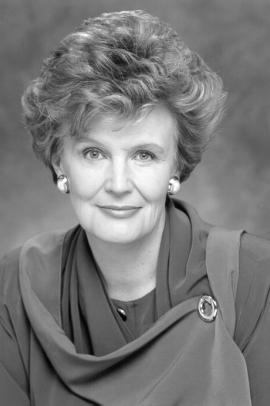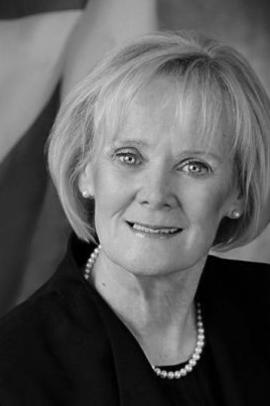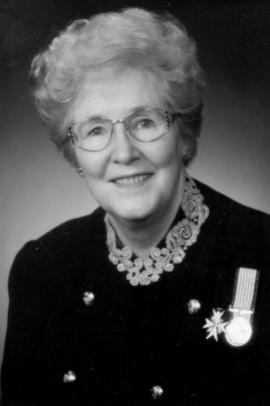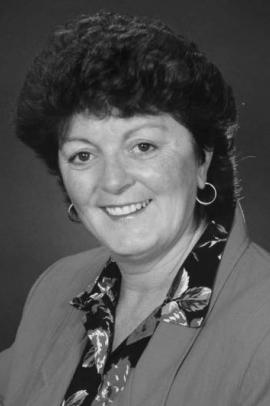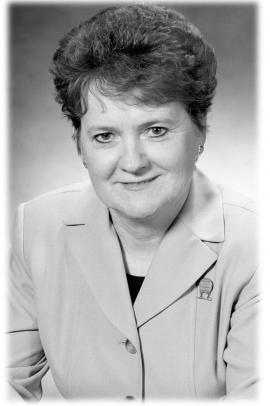It was quite the way for Hon. Catherine Callbeck to overcome her shyness.
Standing on stage dressed in period costume to kick off Bedeque Area Centennial Days, she was about to address the crowd of several hundred.
“All of a sudden the strap that was holding up my petticoat broke,” the no-nonsense former Premier said while laughing about the event, which occurred more than 40 years ago. “It fell right on the platform.”
Most people would have stopped dead in their tracks, crippled by embarrassment and unable to go on.
Not Callbeck.
“I just finished the speech. At the end I walked back the best I could and kicked it over the stage.”
She knew then if she could survive that embarrassing moment she could do almost anything.
“Things like that help you get over shyness,” said the retired Senator. “After that, because those days had been so successful, everything that came along they would be after me for this committee, that committee, the other committee.”
Callbeck is a woman of firsts.
She was the only woman in her commerce degree program at Mount Allison University in 1956 and its second woman graduate of that program.
She was the only woman teaching business administration among the staff at the Saint John Institute of Technology upon its establishment.
Calbeck was the lone woman in Alex Campbell’s cabinet in 1974.
She was the first woman to hold the position of Premier of Prince Edward Island.
Callbeck was the first woman elected Premier in Canada.
THE EARLY YEARS
Catherine Sophia Callbeck was born on July 25, 1939, in Central Bedeque, Prince Edward Island, the only daughter of Ralph R. and Ruth (Campbell) Callbeck, and sister to Bill. She grew up and still lives in the home purchased by her entrepreneur grandfather, William Callbeck, a comfortable house constructed in 1863.
Ralph ran the family business, the local corner store, that his father had operated as a tailor shop. Her mother, Ruth, was a teacher before settling down to raise a family. She ran the home while her father’s focus was on the business.
Ruth hailed from Summerside, and was born into a high-profile political family who often would talk politics during Catherine’s Sunday afternoon visits to their home.
As a child and young woman, Callbeck never thought of gender as a barrier, noting there were many strong women role models to admire both in her daily life and in her community.
“I remember one woman who had a big impact on me as a child. We had a chartered accountant do our income tax every year. She used to come here every year from Charlottetown,” she recalled. “It always impressed me how she could talk figures and business with my father.”
With the example that her parents set of community volunteerism, a young Callbeck would give of her time working with and for others. She vividly remembers, as a teen, days spent working as counsellor at Camp Abegweit, a place where she forged friendships that would last a lifetime.
Callbeck’s entrepreneurial spirit was alive and well at a very young age, with her first successful business venture a roadside lemonade stand, which she operated during the summer months.
A good student, she excelled in her studies at the two-room schoolhouse in Central Bedeque before moving on to complete high school in Summerside.
School was one of her favourite places.
MODEL PARLIAMENT – THE BEGINNING OF A LIFELONG LOVE OF POLITICS
After graduating high school, Callbeck left Prince Edward Island for New Brunswick where she attended Mount Allison University to study business administration, receiving a bachelor of commerce degree from the school in 1960.
There, she had her first foray into politics, spending a number of years in model parliament. That was when her true love of politics was born.
“Each residence would run one or two people for each party and the first year I was asked to join the Liberals, which I did. I made many friends there. We had an awful lot of fun,” she recalled. “I sat in model parliament those three years and I remember one of the big issues of the day was the (fixed) link.”
From Mount Allison, Callbeck worked for a short time at CBC in Halifax and taught commerce at McAdam High School for a year before heading back to school at Dalhousie to obtain her bachelor of education.
She returned to New Brunswick to teach business administration in Saint John, where she was the only woman in the business faculty. There, she spent four years before going to Toronto to teach business administration for a year.
MOVING HOME, GETTING INVOLVED, AND EXPLORING THE COUNTRY
During breaks from her schooling and work, Callbeck travelled Canada and the world with friends. She backpacked through Europe in 1960, travelled across Canada and the United States in the summer of 1964, and even took a job one summer as a waitress in Jasper Park Lodge, travelling to the Western Canada locale by rail so that she could experience the country in all its grandeur for the first time.
In 1968, Callbeck returned to Prince Edward Island for the summer after finishing her stint teaching in Toronto. She had fully intended to return to Toronto in January 1969 to work in the executive offices of a large public corporation.
Those plans changed, as she remained home to help run the family business alongside her brother, Bill. She became involved in her community, and was well on her way to building a solid reputation and far-reaching network that would later benefit her as she sought to enter public life.
Callbeck became involved in the Liberal Party of PEI executive in the riding of 4th Prince during this time, and served on the party’s executive in the federal riding of Malpeque. She helped with fundraising, building teams, and securing candidates.
Her shyness, though, was always present.
“I had to push myself. I pushed myself different times through my life to get over this shyness because I realized if I didn’t get over it I would never be able to do the things that I wanted to do.”
THE DECISION TO RUN FOR PUBLIC OFFICE
Throwing her hat into the political ring was something that had never crossed Callbeck’s mind. In the early 1970s, she was focused on giving back to her community while helping to run and grow the family business. She wanted to make her community, and the Island, a better place to live.
Through her volunteer and fundraising efforts at this time, Callbeck would learn a valuable lesson, one that would later guide her decision to enter the realm of politics.
“The big decisions are made in the legislature in Charlottetown. They’re not made out here in Central Bedeque.”
A visit by Premier Alex Campbell led her to seek the Liberal nomination in 4th Prince in the lead up to the 1974 general election.
Callbeck felt confident in her accomplishments and resume, and that both would help her win the nomination even though a high-profile Liberal – a man – was also vying for the position. She took nothing for granted and worked hard for the nomination, visiting each of the delegates to ensure that they cast their ballot for her at the nomination convention.
She was not deterred by the fact that she was a woman entering what was traditionally, at the time, the male-dominated world of politics.
“When I went to Mount Allison I was the only woman taking commerce in that class. I went to teach in Saint John, I was the only woman teaching in the business administration staff. I came back home and I was in business and I dealt a great deal with men,” said Callbeck.
“Because of my previous experience I was comfortable working in a man’s environment.”
THE CAMPAIGN TRAIL, THE WIN, AND A CABINET SEAT
Callbeck's hard work paid off as she won the nomination to represent the Liberal party for one of the seats in her riding in the 1974 election.
She hit the campaign trail, once again putting in long hours and pushing herself out of her comfort zone so she could knock on every door in her district, and reach as many voters as possible.
That effort paid off when, on April 29, 1974, Callbeck became the second woman elected to the Legislative Assembly of Prince Edward Island.
Callbeck soon became PEI’s Minister of Health, Minister of Social Services, Minister Responsible for Non-Status Indians, and Minister Responsible for Disabled Persons, and the only woman in Premier Alex Campbell's cabinet.
Under her guidance as Minister of Health and Social services, group homes were expanded and new manors built, social programs were expanded, the groundwork was laid for the construction of the Queen Elizabeth Hospital, federal transfers had improved, and numerous other initiatives were introduced that helped change the lives of some of the Island’s most at-risk and poorest citizens.
“Social Services was a real eye-opener for me because I ran into problems I never thought existed on PEI,” said Callbeck. “Some of the conditions that people were living in, and the hardship.”
She became known as one of the most committed ministers of those departments, and introduced programming that, to this day, that has and continues to greatly benefit countless Islanders.
BACK TO BUSINESS THEN BACK TO POLITICS, IN PARLIAMENT
After four years in the Legislative Assembly of Prince Edward Island, Callbeck decided not to seek re-election in 1978. A political life was set aside, and Callbeck’s focus returned to helping run and grow the family business.
Politics, though, was never fully out of mind.
"Every election I would have people come after me to run,” said Callbeck.
When she decided to return to the political arena, Callbeck had her eye on federal politics with the goal of becoming the next Member of Parliament for Malpeque.
She won that seat on Nov. 21, 1988, and was a member of the Official Opposition in the House of Commons. As an Opposition member, Callbeck held various posts and took the government of the day to task on numerous issues.
It was a big change for Callbeck who, as an MLA, had been on the government side of the Assembly.
“I found Opposition difficult because I would rather get on with something and get it done rather than criticize the governing party, so I would rather be in the government side.”
RETURN TO RED SOIL – LEADING THE PARTY AND THE PROVINCE
Her time on Parliament Hill was shorter than anticipated.
Callbeck had fully intended to seek a second term as an MP for Malpeque, but news from back home derailed her plans.
“Joe Ghiz resigned and the calls started coming", recalled Callbeck, referring to the resignation of Prince Edward Island's Premier of the day, who was also the leader of the province's Liberal Party.
Ghiz's resignation was announced in October 1992, and the convention to select a new party leader was slated to take place in January 1993.
At first, Callbeck turned down numerous requests that she seek the party's top job.
The calls continued, and Callbeck finally relented.
“I had been in provincial before and in provincial you are closer to the people. I like constituency work very much. You get a great sense of satisfaction out of helping somebody or solving their problems.”
On Jan. 23, 1993, Callbeck won the Liberal leadership by a rather large margin over the two men seeking the job. On Jan. 25, 1993, she was sworn in as Prince Edward Island’s Premier -- the first woman in the province’s history to hold the position.
Two months later, Callbeck led the Liberals to victory in Prince Edward Island's general election, with her party winning 31 of 32 in the Legislative Assembly. The win cemented Callbeck's place in history as the first woman in PEI and Canada elected Premier.
TOUGH DECISIONS
Upon taking office, the newly-elected Premier faced a daunting task.
The financial health of Prince Edward Island was in jeopardy.
“The bond raters told the Minister of Finance that if we didn’t take major action the interest costs would be going up, and we were already paying, I think, $115 million to service the provincial debt,” recalled Callbeck.
“The handwriting was on the wall and hard choices had to be made.”
Callbeck and her government faced tough decisions to reduce and eventually eliminate the $89-million operating deficit of the province. Her government would have to either cut programs and services in health-care and education or adjust the salaries of government employees to avoid cutting jobs
“We spent days, the cabinet, going through all the programs as to where we could eliminate anything. We made some headway getting the deficit down, but it still wasn’t far enough,” she explained.
“Salaries represented over 50 per cent of the provincial budget, and treasury board put forward the option of eliminating hundreds of jobs. I believe the number was 700.”
In May 1994, the Callbeck government introduced the Public Sector Pay Reduction Act, which suspended collective bargaining for all public sector employees for one year, and rolled back salaries above $28,000 by 7.5 per cent and salaries below that by 3.75 per cent.
“We felt it was the fairest way to address the problem,” said Callbeck.
There were protests by public sector employees and their unions, criticism from some media, and an outcry by the Official Opposition of the day.
“The rollback caused a great deal of anger and confusion. The Conservatives really went to town on it and it was clear the government, and I, as Premier, would pay a price politically for taking this decisive action,” said Callbeck.
“If they felt so strongly, why didn’t the Conservatives reverse the decision when they formed government?”
Looking back, is it a decision that Callbeck regrets?
“Given the dire circumstances and the information before us, I think we made the fairest decision we could have, though a more in-depth public information campaign would have better served everyone.”
That decision and the keen fiscal management of the Callbeck government helped improve the province’s coffers and greatly reduced the deficit.
STEPPING DOWN AND THE SENATE CALL
Callbeck’s time as Premier ended when, in 1996, she announced she was stepping down from the position and as leader of the Liberal Party of Prince Edward Island in August of that year.
She felt that the province was in good economic health, and that the party was in a good position to win the next election.
“We balanced the budget. In fact, we had a surplus budget, so the province was in better financing than it had been in decades. Economic development, we were second in Canada. We had lower electricity rates. The (Confederation Bridge) Link was complete,” she recalled. “Looking back, we did too many things in a relatively short period of time.”
Callbeck pointed out at the time her government and party were still leading in the most recent polls, noting the Liberals were 10 points ahead of the Progressive Conservatives.
Running the province, though, was draining work.
“I really was having trouble with my energy. I was diagnosed soon after with rheumatoid arthritis,” said Callbeck.
“I just felt it was better for the party to have a new leader, for me to get out of the picture, and that’s what I did.”
Callbeck would not be away from politics for long.
A little over a year after her time as Premier officially ended, she was called to the Senate of Canada in September 1997 on the recommendation of Prime Minister Jean Chretien.
She relished the role of Senator, and sat on various committees during her tenure, including working on a health report by the Social Affairs, Science and Technology Committee. That work led to the 2004 health accord and resulted in the injection of millions of dollars injected into crucial areas that aided average Canadians such as pharmaceutical coverage.
As well, the report, Out of the Shadows of Mental Health, compiled by that same committee, paved the way for vast improvements in that area, such as the establishment of the Mental Health Commission.
Callbeck spent almost 17 years in Canada’s Upper Chamber, retiring on her 75th birthday on July 25, 2014.
ADVICE FOR FUTURE POLITICIANS
Today, Callbeck still has a keen interest in politics and whenever possible encourages women – and men -- to get involved.
She had the benefit of having strong women as role models and mentors in her life, notably Jean Canfield, who was the first woman elected to the Legislative Assembly of Prince Edward Island, and someone who she says "was very active" in getting her into politics.
A piece of advice Canfield once shared with her is something she still follows today, and that is to always have a speech prepared, even if you are not slated to speak at an event.
“I never forgot that.”
When it comes to a future in politics, Callbeck asserted there is no formula to follow.
“All I know is from my own experience. I think what helped me a great deal was being involved in so many volunteer associations and projects and taking on an active role so that I got to know a lot of people and these people knew that I would take on responsibility.”
POLITICS IS A WOMAN’S JOB, TOO
The biggest challenge facing women in politics today is the same as it was 40 years ago, said Callbeck.
“To find that balance between family and working,” reiterated Callbeck.
As Premier, she worked hard to ensure that more women were involved on committees, in running campaigns, on boards, and encouraged them to run municipally, provincially or federally.
“You have to realize that when you go into politics you are never going to make everybody happy. You have to have a thick skin and you have to be emotionally pretty strong and stable.”
THE PHOTO – THE FAMOUS 5
Being one of Prince Edward Island’s Famous 5 is something Callbeck speaks about with pride.
“I mentioned it different times when I would be speaking in other provinces,” she said. “I look at that photo with great pride. I feel very fortunate to have worked with those four women who have, as well as raising families, made a huge contribution to the province.”
That moment, when five women from PEI held the five positions of political power, had not happened prior to 1993 on the Island nor elsewhere in Canada. It has not happened since.
“It was a moment in time. All these positions have been held by women at different times in other provinces,” reflected Callbeck.
“I am sure we will see this many times down the road.”
PERSPECTIVE
As she looks back on that time and on her political career, Callbeck has few regrets, if any.
“I get a great deal of satisfaction about a lot of accomplishments that were made by governments, not only that I led but that I was a part of,” she reflected. “As John Turner used to say, 'the greatest honour that anybody can ever receive is to be elected to represent their people', and I really believe that.”
If given the chance, would she do it all over again?
“I certainly wouldn’t do it at 79, but if I was 34 I probably would,” said the former MLA, Cabinet Minister, Premier, Member of Parliament and Senator.
“It was an honour and I feel extremely privileged to have had the opportunities I had and I feel very indebted to the people that have supported and encouraged me over the years in political life.
“Without them my career would not have been possible.”


















